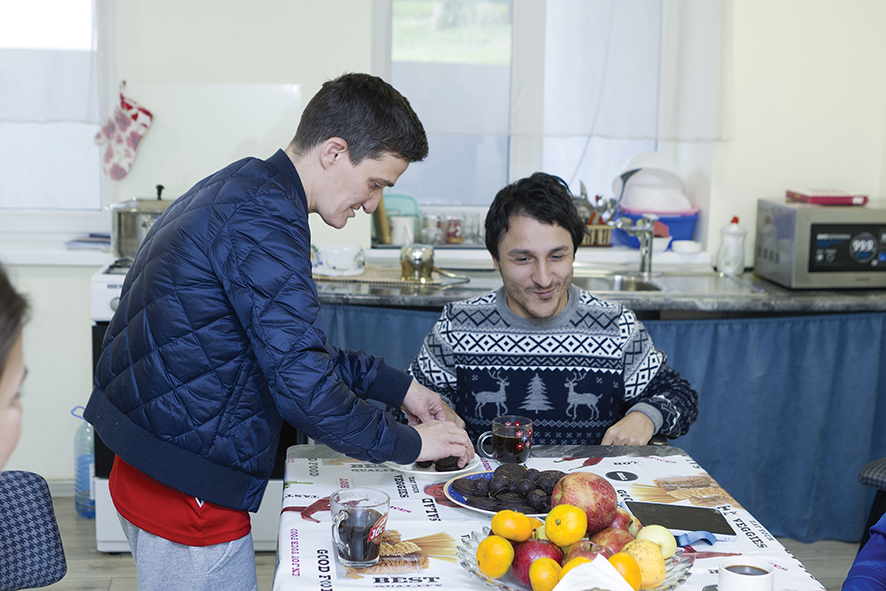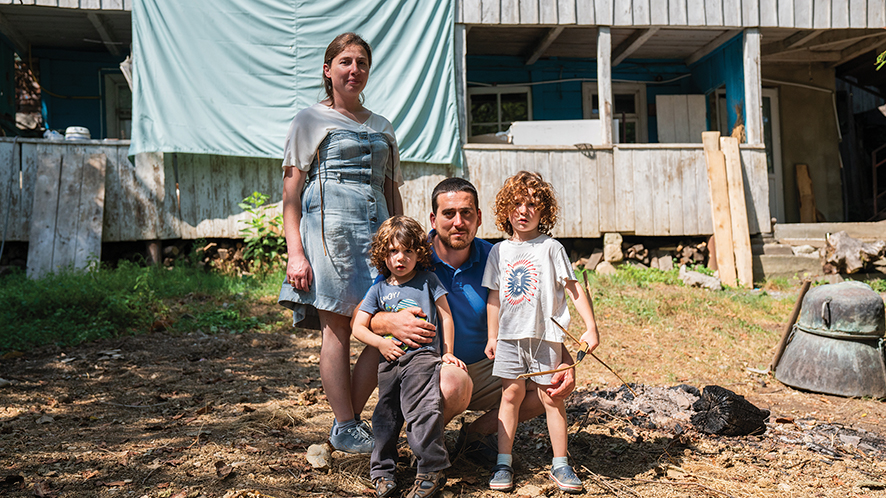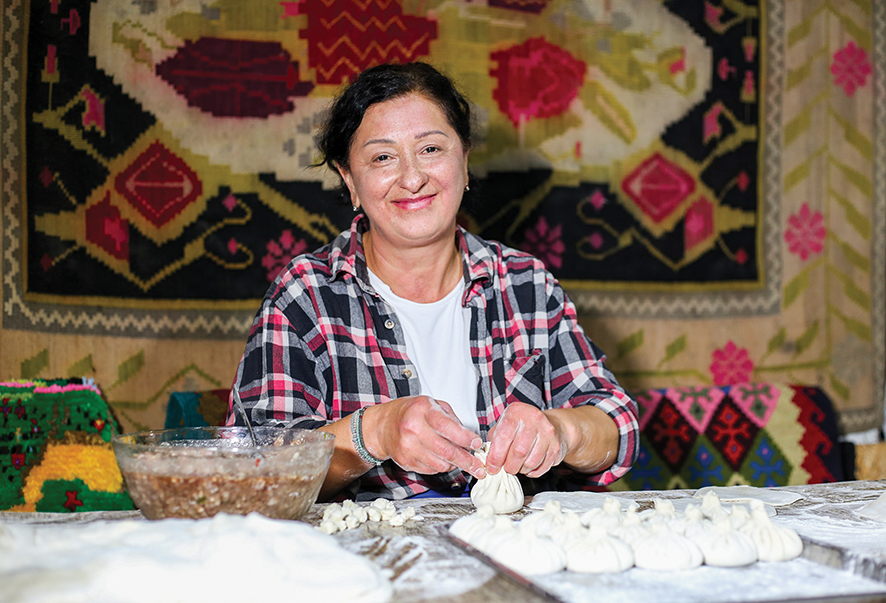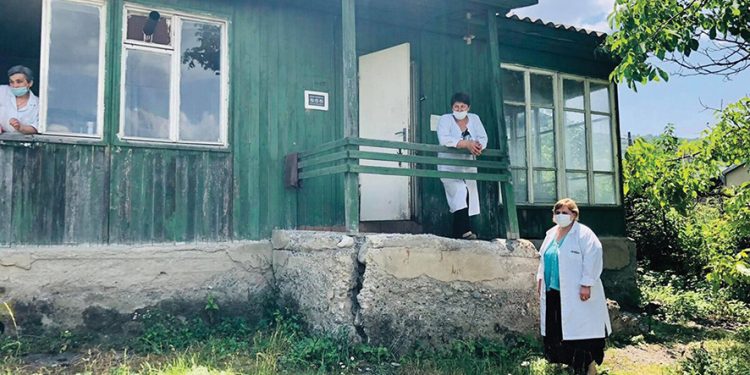The Year 2023 was among the most results-oriented for Caritas Czech Republic in Georgia. We closed two large-scale initiatives in the healthcare and social protection sectors with distinguishing results and started a considerable endeavour for early childhood care and inclusive education improvement in the country. Our team contributed to establishing of wastewater management in the mountainous Racha, supported sustainable agricultural development in the highlands of Georgia, and started a new initiative enabling youth to increase their entrepreneurial skills.
Let’s dive deep to learn more about our success in 2023.

Strengthening primary healthcare and equipped children’s hospital
Caritas Czech Republic has been supporting the Government of Georgia in implementing healthcare reforms nationwide since 2015. Our activities include improving and assuring the quality of primary care services, support for early detection and prevention of oncological diseases, developing and implementing digital health solutions and assuring quality of maternal and child healthcare services.
At the end of the year, we had one more success to celebrate with the Government of Georgia – together with the Ministry of Health of Georgia we presented the results of the project “Support to Primary Healthcare Strengthening in Georgia,” on which the project team worked for more than three years. The project achieved crucial outcomes for the development of Georgia’s health sector, namely that the country now has updated clinical protocols and care pathways for family doctors with improved clinical skills and IT solutions supporting family medicine practices throughout Georgia.
In June 2023, Caritas Czech Republic summarized one more crucially important project for the healthcare sector of the country. Within the initiative, we donated medical equipment with a total budget of 150 000 USD to the Zhvania Children’s Hospital of TSMU, which was the final stage of a project that aimed to develop a long-term care service focused on the social and medical needs of children with severe disabilities in state care.
The support provided at an earlier stage of the project envisaged the provision of Zhvania’s Children’s Hospital with necessary medical equipment, elaboration of the package of regulatory documentation for the arrangement of the long-term care system, and capacity-building training sessions for medical personnel across the country.

A strategy and an action plan for the deinstitutionalisation in Georgia and new family-type homes for persons with disabilities
In Georgia, the process of transferring adults with disabilities from large boarding houses to family-type homes began in 2011 and is still ongoing. In 2020, Caritas Czech Republic, in close cooperation with the Government of Georgia and respective partners, developed a deinstitutionalisation strategy and an action plan.
Within the project, 115 persons with disabilities in the Dusheti and Martkofi boarding homes received psycho-emotional support. In addition, by the end of 2023, our organization provided six community-based homes and services for persons with disabilities who had previously lived in two large boarding homes under state care.
The end of the year 2023 was the finishing one for this exciting endeavour as Caritas Czech Republic had the opportunity to speak about the results of the project at the annual presentation of the Unified Coordinating Council for the Implementation of the Law of Georgia “On the Rights of Persons with Disabilities”, initiated by the Ministry of Health of Georgia.

Wastewater management infrastructure for mountainous areas
Since 2018, Caritas Czech Republic’s environmental activities focuses on raising awareness about the importance of sustainable waste management and introducing relevant practices in rural Georgia. In this regard, our organization has been actively supporting the development of infrastructure in the regions for waste collection, separation and recycling and introducing waste separation, recycling and composting practices in the Racha-Lechkhumi and Kvemo Svaneti region and providing respective technical assistance in the Dusheti and Khulo municipalities.
With this in mind, in 2023, we continued working on developing the wastewater management infrastructure in Oni municipality to improve water quality and resource management there. Within the project, in the spring of 2023, Caritas Czech Republic and Ecocentrum Sosna handed over an assanisation vehicle to the Oni Municipality City Hall, which helps the municipality manage the wastewater infrastructure.
Our experts developed the strategy and action plan for the Oni Municipality’s wastewater and water treatment system, guidelines on wastewater treatment solutions, and replication strategy for implementing wastewater treatment projects.
Last, we have supported the local community with wastewater treatment solutions (biofilter, biological wastewater treatment plant, compostable toilet). Also, we awarded three local schools with portable water laboratories.

Support to the cattle breeding
The growth of highland regions is part of Georgia’s regional development policy. However, it requires a specific approach as mountainous settlements, contrary to the other areas of the country, have limited agricultural resources, fewer economic opportunities, and are more at risk of natural disasters. Caritas Czech Republic’s rural development initiatives include supporting local farmers and entrepreneurs in mountainous settlements of Georgia and providing trainings tailored to the local needs. Our interventions contribute to Georgia`s national sustainable development goals.
Within our rural development initiative started in 2022 and targeting 75 farmers from Tusheti, Pshav-Khevsureti, and Khulo Municipality, this year, various important activities were conducted, namely veterinary training sessions and consultations for local farmers, financial support to fifteen farmers enabling them to ensure cattle with better feed, awareness-raising campaigns on artificial insemination with 100 processes conducted, support to four projects oriented on developing veterinary services, establishment of four demo plots for introducing a system of rotational grazing allowing local people to properly manage the pasture, enhance its productivity and thereby improve the productivity of cattle.
Notably, Caritas Czech Republic has established cooperation with the National Food Agency, within which we will grant them the thermo bags and a generator for the storage of vet preparations.
New initiative which enables youth from Georgia, Armenia, and Moldova to increase their entrepreneurial skills
In Georgia, Armenia, and Moldova, the realisation of vulnerable young people in the labor market and their active involvement in democratic life is still a challenge. The mentioned especially prevents ensuring a dignified life for youth with disabilities. That is why Caritas Czech Republic and the Coalition for Independent Living, together with the Moldavian organization Millenium and the Armenian organisation Agate, started a European Union-funded project that will support the employment of vulnerable youth, the improvement of entrepreneurship opportunities, and their active participation in democratic life.
The project works in three main directions, namely: strengthening existing state and CSO-based employment support services in terms of digital career counselling, increasing the technical capacity of CSOs working with disadvantaged youth including PwDs and NEETs and upscaling their digital competencies, and ensuring active participation of youth in democratic and socioeconomic life by increasing their awareness on the opportunities of digitalisation as well as risks of cyberbullying and disinformation.
Small recap to past projects
This year, we have toured around various regions of Georgia to see the results of the initiatives supported through our projects several years ago.
First, we went to Tusheti, a historic mountainous region in the north of the country, often called the paradise of Georgia. We were delighted to see how the local hotel works successfully after receiving a grant from us to maintain their business, how the middle-aged man and his parents run a hay production, and how a mother of two offers traditional Tushetian meals at her small café.
Thanks to the support back then, the ambulance handed over to the Akhmeta municipality for the Tusheti area still serves the local population. When we visited Tusheti, the doctors told us how recently they survived three men thanks to this vehicle.
Later, we visited the only wool production in the Zemo Alvani village, which provides wool to the whole country, and the women’s enterprise working on the felt craft products for locals and tourists.
In the Racha-Lechkhumi and Kvemo Svaneti region, we got acquainted with the livelihood projects’ results supported during COVID-19. We saw how those people maintained the endeavours born during the challenging pandemic.
We also had an opportunity to see how the children with developmental delays are treated appropriately at the early childhood development center and how the autism programme works there supported by Caritas Czech Republic through its autism project.
During the tour, we visited several rural doctors who told us how their capacities were increased through initiatives. We also saw the Zugdidi Screening Center that became the hope for thousands of people living in West Georgia to identify cancer diseases at an early stage and, thus, stay alive.
Donor organisations make a special contribution to the development of Georgia
Czech Development Agency (CzechAid), United Nations Development Program (UNDP), United Nations Children’s Fund (UNICEF), United Nations Partnership on the Rights of Persons with Disabilities (UNPRPD) Multi-Partner Trust Fund, European Union (EU), Slovak Development Agency — this is the list of donor organisations that positively evaluated the results of the projects implemented by Caritas Czech Republic Country Office in Georgia in the past years and expressed their trust in us in 2023 as well.
The projects initiated by the public and private sector partnership gave us the opportunity to work at the systemic level, and to participate in the improvement of people’s lives in various directions. The above-mentioned projects could not be implemented without the desire and constant support of our local partners among which we would like to express special gratitude to the Ministry of Health of Georgia, Georgian Medical Holding, and State Care Agency, and local governments in the projects’ target municipalities.
By Nina Kopaleishvili















